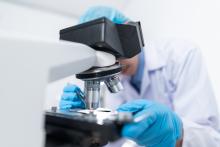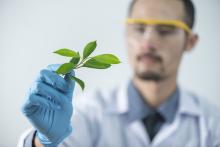Course description
Course organisation
Call for tenders
Annexes to the call for tenders
General contents
The present CdD aims to train highly qualified professionals capable of designing, conducting and promoting research activities in the field of biotechnology, intelligent and sustainable technologies for the management of natural resources, agri-food systems and more generally the environment. This goal will be achieved through training in basic and applied research, providing interdisciplinary, multidisciplinary and transversal scientific skills, which by combining the principles of the circular economy, digital transition and green Technologies can promote the process of vertical and horizontal integration between supply chains. The training path, in fact, although it is characterized as the natural continuation of a training path relating to agricultural and food sciences, integrates on the one hand the skills of biotechnology, and on the other, engineering and logistics applied to agricultural and food systems. Higher education is in fact the basis for the construction of a path that aims at organizational, technological and cultural innovation in the agri-food sector. In fact, by completing the PhD program, the dual purpose of introducing highly qualified personnel to the world of work and at the same time increasing knowledge in specific research areas would be pursued, through participation in projects at a national and international level. The course, although not characterized as an industrial PhD, provides for the involvement of production and processing companies present in the regional and national territory on specific research projects, thanks to the direct co-financing of the same activities by the companies and thanks to participation in regional, national and international research calls, as documented by the intense research and development activity, and third mission carried out by the Department. This will favor on the one hand the technology transfer and therefore the innovation of these companies, and on the other it will facilitate the hiring of research doctors by the companies.
In particular, upon completion of the training program, these researchers will be able to independently conduct design and implementation activities of research programs, and to develop critical skills for the analysis of new ideas and new or existing processes. There will be two curricula, with common and specific training activities for each curriculum, with the following themes:
- Sustainable agriculture, management of natural resources and biodiversity
- Innovative technologies for food quality and safety
In addition, given the strong interdisciplinarity and multidisciplinarity also within each curriculum, as can be seen from the number of scientific sectors involved, the training includes, in addition to mandatory training activities,elective courses to be included in individual training projects, which may also be integrated with training activities at research institutions and other universities, both in Italy and abroad. In general, training will be carried out in qualified operational and scientific structures for study and research activities and in an environment with a strong international character. In carrying out training and research activities, several external research structures are involved, in agreement with the doctorate, which can finance additional scholarships and host students for research and training activities in their own locations. The teaching staff includes researchers from prestigious research institutions, such as the Cerealicoltura e Colture Industriali Research Centre (CREA Foggia) and the Mediterranean Agronomic Institute (CIHEAM-BARI), which is an international training and research institution, as well as a professor from the University of Bari and two professors from foreign universities (University of Cordoba, Spain and University of Florida, USA). The department also has several agreements with international universities and research institutions, which include among their purposes the exchange of researchers and doctoral students, and for the previous doctoral course it has activated several thesis projects in co-supervision with foreign universities. Finally, an agreement is underway with the Universities of Udine and Catania for joint training activities and which includes the organization of an annual event in which students of the various years present the progress of their research projects in a meeting organized in the form of a conference, in which professors from the universities involved and/or invited speakers open the work sessions with transdisciplinary keynotes and whose scientific committee is made up of students. In line with the pillars of the PNRR, social and territorial cohesion will be favored and gender integration will be promoted.The department also has several agreements with international universities and research institutions, which include among their purposes the exchange of researchers and doctoral students, and for the previous doctoral course it has activated several thesis projects in co-supervision with foreign universities. Finally, an agreement is underway with the Universities of Udine and Catania for joint training activities and which includes the organization of an annual event in which students of the various years present the progress of their research projects in a meeting organized in the form of a conference, in which professors from the universities involved and/or invited speakers open the work sessions with transdisciplinary keynotes and whose scientific committee is made up of students. In line with the pillars of the PNRR, social and territorial cohesion will be favored and gender integration will be promoted.The department also has several agreements with international universities and research institutions, which include among their purposes the exchange of researchers and doctoral students, and for the previous doctoral course it has activated several thesis projects in co-supervision with foreign universities. Finally, an agreement is underway with the Universities of Udine and Catania for joint training activities and which includes the organization of an annual event in which students of the various years present the progress of their research projects in a meeting organized in the form of a conference, in which professors from the universities involved and/or invited speakers open the work sessions with transdisciplinary keynotes and whose scientific committee is made up of students. In line with the pillars of the PNRR, social and territorial cohesion will be favored and gender integration will be promoted.
Learning objectives
The research objectives of this PhD program, in line with the priorities for sustainable development identified by the United Nations General Assembly, with the goals indicated in the 2030 Agenda for Sustainable Development and with the PNRR plans, concern 2 macro-areas, that of the issues relating to agriculture, natural resources and environment and the more specific ones of food transformation technologies and processes, providing in both transversal areas such as green technologies, ecological transition and digital innovation. In particular, this course pursues the advancement of knowledge through training in basic research and applied research, carried out in an attractive and critically stimulating institutional environment, in which the PhD student can acquire autonomy and responsibilities useful for the subsequent professional path; promotes interdisciplinary, multidisciplinary and transdisciplinary training opportunities, also through active participation of companies; contributes to the strengthening of transnational and international relations in the field of research, making a period of mobility abroad mandatory and activating forms of co-supervision PhD; provides for the acquisition of transversal skills in order to facilitate their transfer and development in the scientific and professional fields. It will be essential to promote the advancement of knowledge in the field of sustainable agriculture and circular economy; renewable energy; technological innovation; food safety and traceability; digitalization of the production system; streamlining of production processes; the protection of the environment and the territory.
In particular, researchers will be trained to:
- Recognize research needs in the field of issues concerning natural resources, agriculture, the environment and the agri-food system and their scientific, social and economic relevance;
- Conceive, design and independently conduct high-level basic and applied research programs, participating in public and private funding on a local, national and international scale;
- Quantify and distribute research costs;
- Write and critically review scientific publications;
- Disseminate research results and knowledge through teaching activities and presentation of data and results;
- Transfer research results to the public and private sectors;
- Critically analyze processes and develop innovative technological solutions;
- Evaluate the impact of innovation on existing processes and estimate the cost-benefits of innovation;
- Evaluate the sustainability of production processes and innovations;
- Develop process management skills, even complex ones, alone or in coordination with other subjects;
- Choose estimation tools suitable for supporting public decisions.
Educational activities
Expected teachings
- Information systems and experimental data processing
- Advanced statistics
- Green economy: economic, social and environmental aspects
- Research Methods: Theoretical Aspects and Applications to the Agri-food Sector
- Trends in analytical techniques for quality and safety controls in the agro-food sector
- Precision Livestock Farming: challenges and opportunities
- Impact of microbial communities in food and environment
- Parasitic contaminants of raw vegetables and fruits and public health
- Geographic information system
- Enzyme assays in plant cell extracts: a practical approach
- Machine vision for food quality inspection
- Programming Basics
- Microstructural analysis of food and agricultural products
- Sustainable agriculture and food production
- Synchrotron radiation, basics and application in environmental samples
- Molecular biology techniques: applications in animal, plant and microbial genetics
- Microbial Processes for the Valorization of Agro-Food and Industrial Waste
Other educational activities
- Laboratory activities
- Linguistic improvement
- Computer improvement
- Management of research and knowledge of European and international research systems
- Valorisation and dissemination of results, intellectual property and open access to research data and products
- Core principles of ethics, gender equality and integrity
- Seminars
Admission requirements
Master's degrees:
- LM-3 Landscape Architecture
- LM-6 Biology
- LM-7 Agricultural Biotechnology
- LM-8 Industrial Biotechnology
- LM-9 Medical, Veterinary and Pharmaceutical Biotechnology
- LM-17 Physics
- LM-18 Computer Science
- LM-21 Biomedical Engineering
- LM-22 Chemical Engineering
- LM-23 Civil Engineering
- LM-24 Building Systems Engineering
- LM-25 Automation Engineering
- LM-26 Safety Engineering
- LM-27 Telecommunications Engineering
- LM-28 Electrical Engineering
- LM-29 Electronic Engineering
- LM-30 Nuclear and Energy Engineering
- LM-31 Management Engineering
- LM-32 Computer Engineering
- LM-33 Mechanical Engineering
- LM-35 Environmental and Land Engineering
- LM-41 Medicine and Surgery
- LM-42 Veterinary Medicine
- LM-48 Territorial, urban and environmental planning
- LM-52 International Relations
- LM-53 Materials Science and Engineering
- LM-54 Chemical Sciences
- LM-56 Economics
- LM-59 Public, Business and Advertising Communication Sciences
- LM-60 Natural Sciences
- LM-61 Human Nutrition Sciences
- LM-69 Agricultural sciences and technologies
- LM-70 Food Science and Technology
- LM-71 Industrial Chemistry Sciences and Technologies
- LM-73 Forestry and environmental sciences and technologies
- LM-74 Geological sciences and technologies
- LM-75 Sciences and technologies for the environment and the territory
- LM-77 Business and Economics
- LM-79 Geophysical Sciences
- LM-82 Statistical Sciences
- LM-83 Actuarial and financial statistical sciences
- LM-86 Animal science and technology
- LM/GASTR Economic and social sciences of gastronomy
- LM Sc. Mat. Materials Science
- LM-53. Materials Engineering
Job and professional opportunities
At the end of the course of study, the PhD will represent a prominent figure capable of recognizing research needs and economic and social dynamics and of carrying out a highly innovative professional role that serves to fill these needs. This figure will be able to deal with research and therefore transfer research results, develop research projects independently at regional, national or international level, or hold senior roles in public or private companies, with particular reference to the management of complex systems. The PhD will, in fact, be able to hold leading roles in production, research and development, in the field of marketing, as well as in executive and managerial management. In relation to the different areas, these roles may be exercised both for public bodies (Universities, Research Centres, Public Administrations), and for private profit organisations (agri-food companies, agri-food distribution, import-export of goods and services, research and development, chemical companies, companies for the development of analytical instruments, plants, biotechnological solutions, solutions for energy production), and non-profit organisations (planning and sustainable development of geographical areas, non-governmental organisations, etc.).
Curricula with educational activities
Sustainable agriculture, natural resources and biodiversity
This curriculum will develop skills for the sustainable management of natural resources and agriculture, with particular attention to precision agriculture and smart farming, decision support systems, reduction of inputs in agriculture, logistics and management of production inputs and outputs (internet of things), quality of production, protection of the environment, animal, plant and microbial biodiversity, bioindustry for the valorization of waste and non-food products for the closure of the cycle, biorefinery, biogenetics.
Emerging technologies for ensuring food quality and safety
Skills will be developed for the precision management of processes, logistics and management of transformation inputs and outputs (internet of things), quality, traceability and safety of food products, biotechnologies and innovative technologies with low environmental impact, in order to increase the added value of products, maximizing efficiency and reducing waste; evaluation of the sustainability of products and processes, strategies to increase awareness of consumers and supply chain actors on environmental issues; marketing of sustainably obtained food products.







